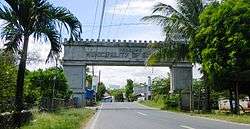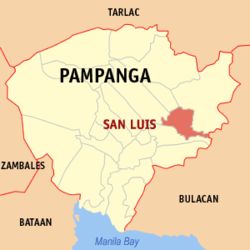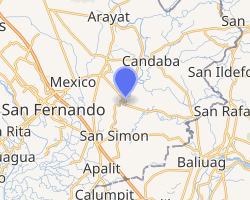San Luis, Pampanga
San Luis, officially the Municipality of San Luis (Kapampangan: Balen ning San Luis; Tagalog: Bayan ng San Luis), is a 3rd class municipality in the province of Pampanga, Philippines. According to the 2015 census, it had a population of 54,106 people.[3]
San Luis | |
|---|---|
| Municipality of San Luis | |
 Welcome Arc | |
 Seal | |
 Map of Pampanga with San Luis highlighted | |
OpenStreetMap 
| |
.svg.png) San Luis Location within the Philippines | |
| Coordinates: 15°02′24″N 120°47′31″E | |
| Country | |
| Region | Central Luzon (Region III) |
| Province | Pampanga |
| District | 4th District |
| Founded | 1761 |
| Barangays | 17 (see Barangays) |
| Government | |
| • Type | Sangguniang Bayan |
| • Mayor | Jayson S. Sagum |
| • Vice Mayor | Roman A. Sagum |
| • Congressman | Juan Pablo P. Bondoc |
| • Electorate | 35,129 voters (2019) |
| Area | |
| • Total | 56.83 km2 (21.94 sq mi) |
| Population (2015 census)[3] | |
| • Total | 54,106 |
| • Density | 950/km2 (2,500/sq mi) |
| • Households | 10,865 |
| Economy | |
| • Income class | 3rd municipal income class |
| • Poverty incidence | 9.61% (2015)[4] |
| • Revenue (₱) | 104,400,888.71 (2016) |
| Time zone | UTC+8 (PST) |
| ZIP code | 2014 |
| PSGC | |
| IDD : area code | +63 (0)45 |
| Climate type | tropical monsoon climate |
| Native languages | Kapampangan Tagalog |
Barangays
San Luis is politically subdivided into 17 barangays. Like the town itself, all political subdivisions are named after Roman Catholic saints.
- San Agustin
- San Carlos
- San Isidro
- San Jose
- San Juan
- San Nicolas
- San Roque
- San Sebastian
- Santa Catalina
- Santa Cruz Pambilog
- Santa Cruz Poblacion
- Santa Lucia
- Santa Monica
- Santa Rita
- Santo Niño
- Santo Rosario
- Santo Tomas
Climate
| Climate data for San Luis, Pampanga | |||||||||||||
|---|---|---|---|---|---|---|---|---|---|---|---|---|---|
| Month | Jan | Feb | Mar | Apr | May | Jun | Jul | Aug | Sep | Oct | Nov | Dec | Year |
| Average high °C (°F) | 28 (82) |
29 (84) |
31 (88) |
33 (91) |
32 (90) |
31 (88) |
30 (86) |
29 (84) |
29 (84) |
30 (86) |
30 (86) |
28 (82) |
30 (86) |
| Average low °C (°F) | 20 (68) |
20 (68) |
21 (70) |
23 (73) |
24 (75) |
24 (75) |
24 (75) |
24 (75) |
24 (75) |
23 (73) |
22 (72) |
21 (70) |
23 (72) |
| Average precipitation mm (inches) | 6 (0.2) |
4 (0.2) |
6 (0.2) |
17 (0.7) |
82 (3.2) |
122 (4.8) |
151 (5.9) |
123 (4.8) |
124 (4.9) |
99 (3.9) |
37 (1.5) |
21 (0.8) |
792 (31.1) |
| Average rainy days | 3.3 | 2.5 | 3.6 | 6.6 | 17.7 | 22.2 | 25.2 | 23.7 | 23.2 | 17.9 | 9.2 | 5.2 | 160.3 |
| Source: Meteoblue [5] | |||||||||||||
Demographics
|
| ||||||||||||||||||||||||||||||||||||||||||||||||
| Source: Philippine Statistics Authority[3][6][7][8] | |||||||||||||||||||||||||||||||||||||||||||||||||
In the 2015 census, the population of San Luis, Pampanga, was 54,106 people,[3] with a density of 950 inhabitants per square kilometre or 2,500 inhabitants per square mile.
Like other municipalities and cities in Pampanga, its people are mostly Kapampangan.
Religion
Roman Catholicism remains the faith of the majority in San Luis. Other christian religions, such as, Iglesia ni Cristo, United Methodist Church, Members Church of God International, Evangelicals, Ang Iglesia Metodista sa Pilipinas, Baptists, and Born Again Christianity can be found in the Municipality.
Economy
Transportation, trade and commerce in San Luis is concentrated at the town center where the public market, cockpit, municipal hall, church, schools, hospital, clinics, and commercial spaces are situated.
Local government
The municipal government is divided into three branches: executive, legislative and judiciary. The judicial branch is administered solely by the Supreme Court of the Philippines. The executive branch is composed of the mayor and the barangay captains for the barangays. The legislative branch is composed of the Sangguniang Bayan (town assembly), Sangguniang Barangay (barangay council), and the Sangguniang Kabataan for the youth sector.
The current mayor of San Luis, Dr. Jayson S. Sagum or also known as Dr. J, and the vice mayor is Mon A. Sagum
Landmarks
St. Aloysius Gonzaga Church
Its façade can compare immeasurably with existing Spanish-style church edifices and architectural design. The church is located in a place that used to be called Cabagsac, referring to the proliferation of fruit bats. In fact, today, a fishnet is permanently installed high above the altar precisely to catch thousands of bats that are roosting inside the church. The interior is dark, has an ambience of antiquity and mystery and overpowering odor of bat urine. The main attraction is the three-tower facade, perhaps one of its kind in the country. Not to be missed is the ancient cemetery located in a hidden corner at the back of the church, with some tombstones dating back to the 1800s and bearing the names of the town's prominent families, including the Elizaldes, Ablazos, Francos, Tarucs, among others.[9]
Education
There is a prime school in the town aside from public elementary and high schools.
Notable people
- Luis Taruc (June 21, 1913 - May 4, 2005), founder and leader of Hukbalahap, was born of peasant folks in the farming town of San Luis, Pampanga.
Images
 Rice Field in San Jose, San Luis
Rice Field in San Jose, San Luis- Downtown San Luis
- Municipal Hall of San Luis
 Public market
Public market- District Hospital
References
- "Municipality". Quezon City, Philippines: Department of the Interior and Local Government. Retrieved 31 May 2013.
- "Province: Pampanga". PSGC Interactive. Quezon City, Philippines: Philippine Statistics Authority. Retrieved 12 November 2016.
- Census of Population (2015). "Region III (Central Luzon)". Total Population by Province, City, Municipality and Barangay. PSA. Retrieved 20 June 2016.
- "PSA releases the 2015 Municipal and City Level Poverty Estimates". Quezon City, Philippines. Retrieved 1 January 2020.
- "San Luis: Average Temperatures and Rainfall". Meteoblue. Retrieved 5 May 2020.
- Census of Population and Housing (2010). "Region III (Central Luzon)". Total Population by Province, City, Municipality and Barangay. NSO. Retrieved 29 June 2016.
- Censuses of Population (1903–2007). "Region III (Central Luzon)". Table 1. Population Enumerated in Various Censuses by Province/Highly Urbanized City: 1903 to 2007. NSO.
- "Province of Pampanga". Municipality Population Data. Local Water Utilities Administration Research Division. Retrieved 17 December 2016.
- "WOW Philippines :: Explore Philippines :: Things to Do". Retrieved 2008-04-25. Note: Things to Do and see in Pampanga...
External links
| Wikimedia Commons has media related to San Luis, Pampanga. |